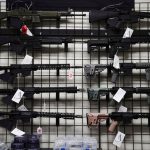
(Reuters) -California cannot enforce a law requiring people to undergo background checks to buy ammunition, because it violates the constitutional right to bear arms, a federal judge has ruled.
In a decision made public on Wednesday, U.S. District Judge Roger Benitez in San Diego said the background checks have “no historical pedigree,” and violate the Second Amendment by treating all citizens as having no right to buy ammunition.
“A sweeping background check requirement imposed every time a citizen needs to buy ammunition is an outlier that our ancestors would have never accepted for a citizen,” wrote Benitez, an appointee of Republican President George W. Bush.
Benitez also criticized California’s handling of the more than 1 million annual ammunition background checks, calling the 11% rejection rate “too high.”
California appealed the decision to the 9th U.S. Circuit Court of Appeals, and Benitez rejected its request for a stay that would allow background checks during that process.
“These laws were put in place as a safeguard and a way of protecting the people of California–and they work,” state Attorney General Rob Bonta, a Democrat. “Background checks save lives.”
Governor Gavin Newsom, also a Democrat, renewed his criticism of Benitez for having issued multiple decisions favoring firearms owners, including a Sept. 2023 ruling that voided California’s ban on high-capacity gun magazines.
“Like clockwork, Judge Benitez has yet again put his personal politics and fealty for the gun lobby over the Constitution and common sense,” Newsom said. “California will fight this extremist, illogical, and incoherent ruling as we defend our life-saving measures that are proven to keep our communities safe.”
Plaintiffs in the case included Kim Rhode, who has won three Olympic gold medals in shooting events, and the California Rifle & Pistol Association.
Chuck Michel, the group’s president and general counsel, called the decision a “big win,” saying California had “blocked many eligible people from getting the ammunition they need, which is the true political intent behind most of these laws.”
NO HISTORICAL ANALOGUES
California voters had in 2016 approved a ballot measure requiring gun owners to undergo initial background checks to buy ammunition, and pay $50 for a four-year ammunition permit.
Legislators amended the measure to require background checks for each ammunition purchase, starting in 2019.
In his Jan. 30 decision, Benitez rejected California’s reliance on dozens of laws dating back to 1789 as “historical analogues” for ammunition checks, including restrictions on ammunition possession by enslaved people, Indians and others.
The judge said it made little sense to argue that “these repugnant historical examples of prejudice and bigotry” against people who were not afforded constitutional rights justified similar restrictions now against people who enjoy those rights.
Federal courts have issued divergent Second Amendment rulings since a 2022 U.S. Supreme Court decision that expanded the right of people to arm themselves in public.
The court said judges shouldn’t use the normal way of assessing a law’s constitutionality when assessing firearms restrictions, and should instead see if they were “consistent with this nation’s historical tradition of firearm regulation.”
Benitez stopped short of endorsing the four-year ammunition permit, but said it would be “a more reasonable constitutional approach than the current scheme.”
The judge had also blocked the background checks requirement in April 2020. A federal appeals court asked him to revisit that ruling in light of the 2022 Supreme Court decision.
Shira Feldman, director of constitutional litigation at the gun control advocacy group Brady, called Benitez’s decision “an attack on the concept of life-saving background check systems.”
The case is Rhode et al v Bonta, U.S. District Court, Southern District of California, No. 18-00802.
To read the full article, Click Here

